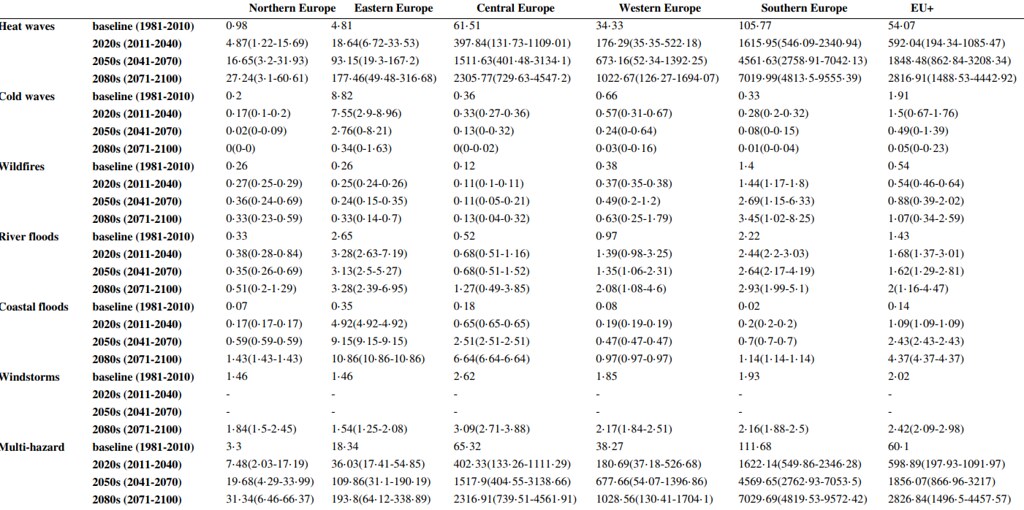 It is summer. Normally the time for relaxation, but even though the rowing is over (alas) there's a T/O coming up and little freizeit; and after that I'm off on holiday; so I should squeeze off a quick cheap post to keep those clicks coming in. And on a summer's day when it is rather cool and pouring with rain (although, the mercurial English climate being what it is, it has changed since I started writing this to glorious sun; by the time I've finished, we'll probably be onto hails of frogs), what better topic than Extreme weather 'could kill up to 152,000 a year' in Europe by 2100?
It is summer. Normally the time for relaxation, but even though the rowing is over (alas) there's a T/O coming up and little freizeit; and after that I'm off on holiday; so I should squeeze off a quick cheap post to keep those clicks coming in. And on a summer's day when it is rather cool and pouring with rain (although, the mercurial English climate being what it is, it has changed since I started writing this to glorious sun; by the time I've finished, we'll probably be onto hails of frogs), what better topic than Extreme weather 'could kill up to 152,000 a year' in Europe by 2100?
Heat waves would cause 99% of all weather-related deaths... Deaths caused by extreme weather could rise from 3,000 a year between 1981 and 2010 to 152,000 between 2071 and 2100 is that even possible? 1% of 152,000 is 1520 so if heatwaves currently cause 50% of all weather-related deaths, yes, it is just about possible. If I search around for causes of death I find this nice chart and, as you'd expect, with 1.5 k out of 300,000 k people, at 0.005%1, weather isn't even close to making the chart; the lowest there is cancer of the uterus, which I'm fortunately immune to, at 6-per-thousand. Even pushed up 100-fold to 152,000 that's only 0.5% (do I need to throw in the conventional "and of course every one of those deaths is sad"? OK then, consider it done) which still isn't even close to making the table; more than another factor of 10 is required. There's a list of tables available. Which one should I look in for weather / climate? None of them it seems. Ah well. The Lancet paper is available, and in the appendix is the table of deaths (table S6 is the one I want). Here is discover that in the EU+, deaths per 10,000,000 from heatwaves is 54 (I omit the spurious precision of ".07"); multiplied by ~30 that indeed comes to 1,500 ish. I inline the table for you; click for a larger view, or indeed proceed to the original.
Note that the UK is not, as I thought smugly, in the "Northern" category that hardly has any deaths even by 2100; that turns out to be Scandinavia, lucky people. We're in "Western", along with France, which extends quite a way South and, I suspect, supplies many of the deaths. I am slightly reluctant to accept the balance of heat-to-cold deaths as presented there; an overall ratio of 25-to-1 seems implausibly low, on the cold side (recall the arguements from long long ago in sci.env).
The obvious response to this is "adaption". So obvious indeed that the Beeb quotes Experts from South Korea's Seoul National University warned that the study's results "could be overestimated". "People are known to adapt and become less vulnerable than previously to extreme weather conditions because of advances in medical technology, air conditioning, and thermal insulation in houses," they wrote in a comment piece published in the same journal. That seems like a reasonable comment.
[Update: As TB points out in the comments, people can adapt, but the rest of the world rather less so. That's a massive weakness in any attempt to evaluate GW based only on human mortality; indeed I think it is obvious that any changes large enough to serious affect adaptable humans are going to cause massive problems for slower-adapting ecologies -W]
Refs
* European heatwave kills five as temperatures soar above 40C
Notes
1. Ahem. Or more accurately known as "0.0005%", I seem to have lost a 0. See comments.

"The obvious response to this is “adaption”.'
That takes care of one species among millions. What do the rest do? As for adaption, that costs money which the most vulnerable may not be able to afford.
[An excellent point, and one that I intended to mention; I'll do that now -W]
FTFY
Weather will beat cervical cancer with just a sixfold increase.
Well possible even with adaptation :(
The engineering challenges of solar electric air conditioning are interesting. I suspect it will be perfected soon. Actually, I should say the method(s) for lowering of present costs will be found. Currently the batteries demanded by the compressor alone, to counter fluctuations in power, are too expensive.